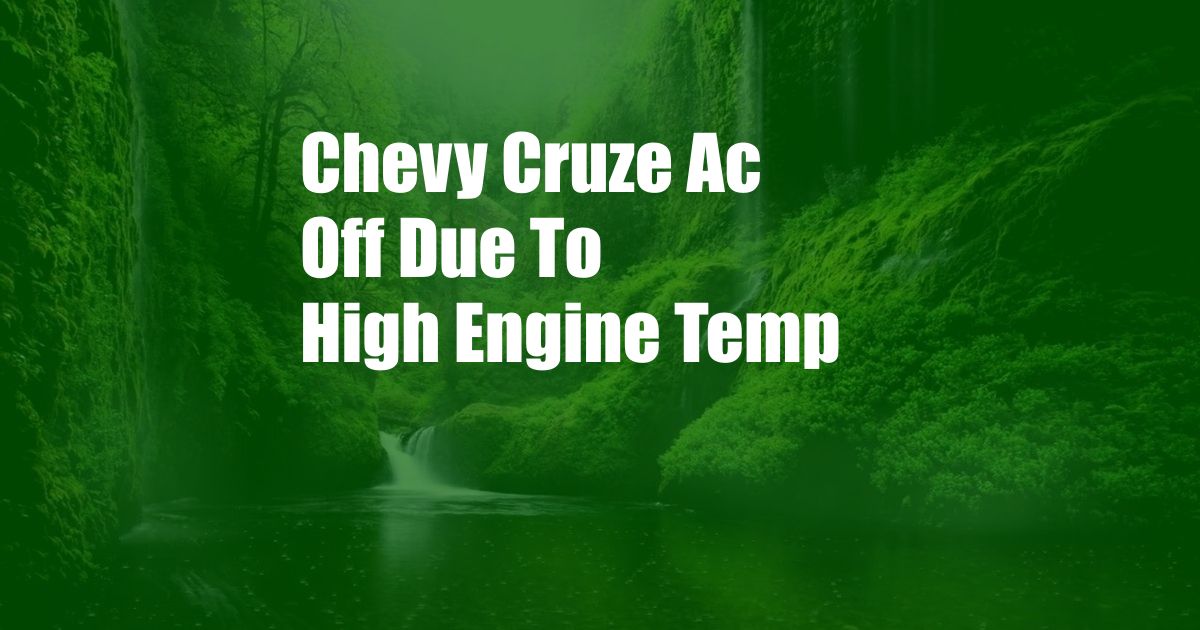
Chevy Cruze AC Off Due to High Engine Temp: A Detailed Examination
As the summer sun blazed relentless, I found myself behind the wheel of my Chevy Cruze, the air conditioning struggling to combat the sweltering heat. Suddenly, a chilling realization washed over me as the AC abruptly shut off, accompanied by a disconcerting warning on the dashboard: “AC Off Due to High Engine Temp.” Panic set in as I frantically searched for a solution, knowing that driving without a functioning air conditioner in the blistering heat could have dire consequences.
After pulling over to safety, I reached for my trusty smartphone and began scouring the internet for answers. It wasn’t long before I stumbled upon a wealth of information that shed light on this peculiar issue. In this comprehensive guide, I’ll share my findings, providing a thorough understanding of the causes and resolutions for the “AC Off Due to High Engine Temp” problem in Chevy Cruzes.
Understanding the Issue: AC System and Engine Temperature
To grasp the problem at hand, it’s essential to understand the interplay between the air conditioning system and the engine’s temperature. The AC system in a Chevy Cruze utilizes a refrigerant to cool the air inside the vehicle. This refrigerant flows through a condenser, where it releases heat and condenses into a liquid. The liquid refrigerant is then pumped through an expansion valve, reducing its pressure and temperature.
The reduction in pressure and temperature causes the refrigerant to vaporize, drawing heat from the air inside the vehicle. The vaporized refrigerant is subsequently compressed in the compressor, increasing its temperature and pressure before being circulated back to the condenser. This continuous cycle results in the cooling of the air within the car.
Causes of High Engine Temperature: A Comprehensive Overview
When the engine temperature rises excessively, the AC system is designed to shut off as a protective measure. This is because the engine’s cooling system has priority over the AC system in maintaining optimal vehicle performance. The following are some common causes of high engine temperature in Chevy Cruzes:
- Insufficient Coolant: The cooling system relies on coolant to absorb and transfer heat away from the engine. If the coolant level is low or the coolant has degraded, it may not be able to effectively dissipate heat, leading to overheating.
- Faulty Water Pump: The water pump is responsible for circulating coolant throughout the engine’s cooling system. If the water pump fails, coolant circulation is compromised, resulting in inadequate heat dissipation.
- Blocked Radiator: The radiator is a critical component of the cooling system, responsible for releasing heat from the coolant. A blocked radiator restricts airflow, impairing its ability to cool down the coolant.
- Thermostat Malfunction: The thermostat regulates coolant flow by controlling the opening and closing of the engine’s coolant passages. A malfunctioning thermostat can prevent coolant from flowing properly, causing overheating.
- Excessive Engine Load: When the engine is subjected to heavy loads, such as towing or driving in mountainous terrain, it can generate excessive heat that may overwhelm the cooling system.
Tips and Expert Advice for Troubleshooting High Engine Temperature
Addressing high engine temperature in your Chevy Cruze requires a systematic approach. The following tips and expert advice can help you troubleshoot the issue and restore optimal cooling:
- Check Coolant Level and Condition: Regularly inspect the coolant level and condition. Ensure the coolant reservoir is filled to the appropriate level and that the coolant is not discolored or contains particles.
- Test Water Pump: If the coolant level is adequate and the coolant is in good condition, you can test the water pump by checking for leaks and listening for unusual noises while the engine is running.
- Inspect Radiator: Visually inspect the radiator for any blockages, such as leaves or debris, that may obstruct airflow. You can also use a hose to gently spray water over the radiator to check for leaks.
- Replace Thermostat: If you suspect a thermostat malfunction, replace it with a new one. This relatively simple repair can potentially resolve high engine temperature issues caused by improper coolant flow.
- Reduce Engine Load: When possible, avoid placing excessive loads on the engine. If you must tow or drive in mountainous areas, take frequent breaks to allow the engine to cool down.
Frequently Asked Questions about High Engine Temperature in Chevy Cruzes
Q: Can I continue driving with the AC off due to high engine temp?
A: No, it is not advisable to continue driving if the AC has turned off due to high engine temperature. Operating the vehicle under these conditions can worsen the overheating and potentially lead to engine damage.
Q: What should I do if the engine temperature gauge remains high even after troubleshooting?
A: If the engine temperature gauge remains high despite implementing the troubleshooting steps above, it is recommended to seek professional assistance from a qualified mechanic. There may be an underlying issue that requires specialized knowledge and equipment to diagnose and repair.
Conclusion: Stay Cool and Drive Safely
Understanding the causes and resolutions for the “AC Off Due to High Engine Temp” issue in Chevy Cruzes empowers you with the knowledge to troubleshoot and address this problem effectively. By following the tips and advice outlined in this guide, you can maintain optimal cooling performance, ensuring comfortable and safe driving conditions.
If you have any further questions or concerns, please don’t hesitate to reach out to a trusted mechanic. Are you experiencing the “AC Off Due to High Engine Temp” problem in your Chevy Cruze? Share your thoughts and experiences in the comments section below.